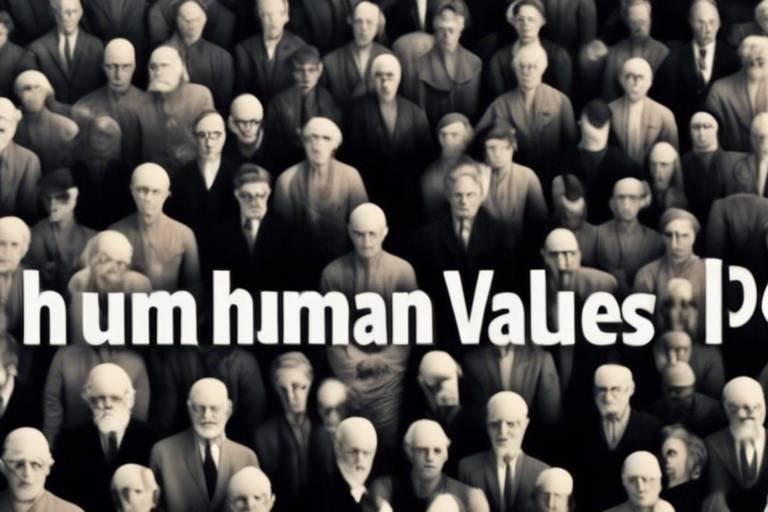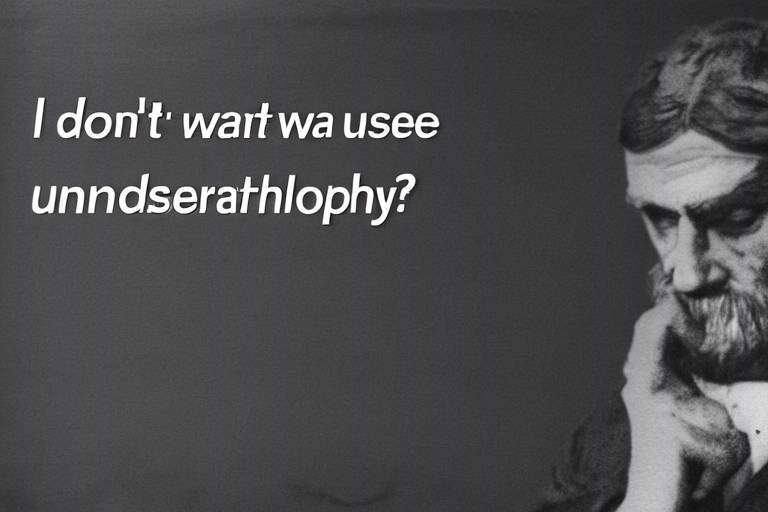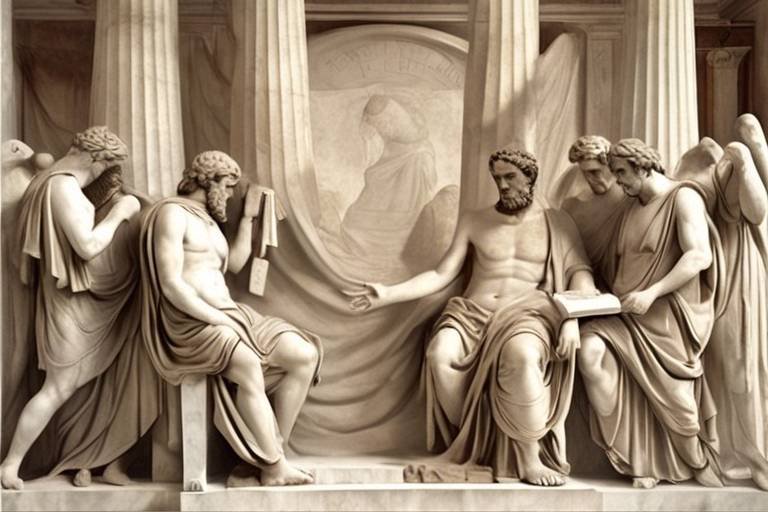The Philosophical Perspective on Human Values
This article explores the fundamental concepts of human values through various philosophical lenses, highlighting their significance in shaping individual and societal norms. At the heart of every society lies a tapestry of values that dictate behavior, influence decisions, and ultimately shape the world we live in. But what exactly are these values? How do they come to be, and why do they matter? The answers to these questions are not only fascinating but also essential for understanding our shared human experience.
Understanding what constitutes human values is essential. This section delves into different definitions and interpretations across cultures and philosophies, illustrating the complexity of these fundamental beliefs. Human values can be seen as the guiding principles that dictate our behavior and choices. They encompass a wide range of concepts, including honesty, integrity, compassion, and justice. These values are often shaped by cultural, religious, and social influences, which vary significantly from one society to another. For instance, in some cultures, collectivism is valued more than individualism, leading to different societal norms and expectations.
Ethics plays a crucial role in determining human values. This part examines how ethical theories influence our understanding of right and wrong, shaping our values and actions. Ethics can be thought of as the framework through which we evaluate our decisions and behaviors. It helps us navigate the complex landscape of human relationships and societal expectations. Ethical theories such as consequentialism and deontological ethics provide different lenses through which we can assess the significance of our values.
Consequentialism focuses on the outcomes of actions. This subsection explores how this ethical theory impacts the formation and prioritization of human values in decision-making processes. In a consequentialist framework, the morality of an action is determined by its results. This perspective encourages individuals to consider the broader impact of their choices on others and society as a whole. For example, if a decision leads to the greatest happiness for the greatest number, it is deemed morally acceptable. However, this approach also raises questions about the potential sacrifice of individual rights for the sake of the majority.
Utilitarianism, a branch of consequentialism, emphasizes the greatest good for the greatest number. This segment discusses its implications for societal values and individual choices. The core idea of utilitarianism is that actions should be evaluated based on their utility, or the amount of happiness they produce. This can lead to a pragmatic approach to ethics, where the focus is on maximizing overall well-being. However, utilitarianism can sometimes clash with personal values, as individuals may feel compelled to act against their moral compass for the sake of the greater good.
While consequentialism offers insights, it faces criticism. This section highlights the challenges and limitations of applying this ethical framework to human values. Critics argue that focusing solely on outcomes can lead to morally questionable decisions. For instance, if lying results in a better outcome, a strict consequentialist might justify the lie. This raises important questions about the integrity of our values and whether the ends truly justify the means.
Deontological ethics emphasizes duty and rules over consequences. This subsection analyzes how this perspective shapes our understanding of human rights and moral obligations. Unlike consequentialism, deontological ethics argues that certain actions are inherently right or wrong, regardless of their outcomes. This perspective upholds the importance of adhering to moral duties and principles, which can lead to a more consistent application of values. For instance, the belief in human rights as inalienable reflects a deontological approach, asserting that every individual deserves respect and dignity, irrespective of the situation.
Cultural contexts significantly shape human values. This part explores how different cultures define and prioritize values, revealing the diversity in human experience and belief systems. Values are not static; they evolve with society and are influenced by historical, social, and economic factors. Understanding these cultural influences is crucial for fostering empathy and respect in our increasingly globalized world.
Eastern and Western philosophies offer contrasting views on human values. This section compares these perspectives, illustrating how cultural backgrounds influence ethical frameworks and value systems. For example, Eastern philosophies often emphasize harmony and community, while Western philosophies may prioritize individual rights and freedoms. This divergence can lead to misunderstandings and conflicts in a multicultural world, making it essential to appreciate and learn from these differences.
The process of globalization affects human values worldwide. This subsection discusses how interconnectedness leads to value shifts and the blending of diverse ethical perspectives. As cultures interact and influence one another, values can transform, leading to both positive and negative outcomes. While globalization can foster greater understanding and cooperation, it can also result in the erosion of local values and traditions, prompting a re-evaluation of what it means to be human in a rapidly changing world.
- What are human values? Human values are the principles and beliefs that guide our behavior and decisions, encompassing concepts like honesty, integrity, and compassion.
- How do ethics influence human values? Ethics provides a framework for evaluating our actions and decisions, shaping our understanding of right and wrong.
- What is the difference between consequentialism and deontological ethics? Consequentialism focuses on the outcomes of actions, while deontological ethics emphasizes duty and moral rules regardless of the consequences.
- How do cultural contexts shape human values? Cultural contexts influence the definitions and priorities of values, leading to diverse belief systems and ethical frameworks.
- What impact does globalization have on human values? Globalization can lead to value shifts and the blending of different ethical perspectives, affecting how we understand and prioritize values.

Defining Human Values
Understanding what constitutes human values is essential for grasping the intricate fabric of our societies. At its core, human values can be seen as the fundamental beliefs that guide our behaviors and decisions. They are the compass that directs our actions, helping us navigate the complexities of life. However, the definition of human values is not a one-size-fits-all concept; it varies significantly across different cultures and philosophical traditions. For instance, while some cultures may prioritize individualism and personal freedom, others may emphasize community and collective welfare. This divergence illustrates the complexity of human values and their interpretations.
Philosophers and sociologists have long debated the essence of human values, attempting to categorize them into distinct groups. Some suggest that human values can be divided into moral values, which pertain to our understanding of right and wrong, and social values, which reflect our aspirations for societal well-being. These categories can further be broken down into several key components:
- Personal Values: These are the beliefs and principles that an individual holds dear, such as honesty, integrity, and respect.
- Cultural Values: These values stem from the traditions and customs of a particular society, influencing collective behavior and norms.
- Universal Values: These are values that are widely accepted across different cultures, such as justice, equality, and compassion.
Moreover, human values are not static; they evolve over time, influenced by various factors including historical events, social movements, and even technological advancements. For example, the rise of digital communication has transformed how we perceive and prioritize values such as privacy and transparency. As we delve deeper into the philosophical underpinnings of human values, it becomes clear that they are not merely abstract concepts but rather living principles that shape our interactions and societal structures.
In conclusion, defining human values is a multifaceted endeavor that requires an appreciation of cultural diversity and the dynamic nature of belief systems. By understanding these values, we can foster greater empathy and cooperation among individuals and communities, ultimately leading to a more harmonious society.
- What are human values? Human values are the fundamental beliefs that guide our behaviors and decisions, shaping our interactions within society.
- How do cultural influences affect human values? Cultural contexts significantly shape human values, leading to diverse interpretations and priorities across different societies.
- Can human values change over time? Yes, human values are dynamic and can evolve due to social, historical, and technological influences.

The Role of Ethics in Human Values
When we dive into the realm of human values, we quickly realize that ethics serves as the bedrock upon which these values are built. But what exactly does that mean? Well, ethics is essentially the study of what is right and wrong, and it provides a framework for us to navigate the complexities of human behavior. Think of it as the compass that guides us through the murky waters of moral dilemmas. Without ethics, our understanding of human values would be like a ship lost at sea, without direction or purpose.
Ethical theories, such as consequentialism and deontological ethics, significantly influence how we perceive and prioritize our values. For instance, consequentialism suggests that the morality of an action is determined by its outcomes. This perspective encourages us to consider the broader implications of our decisions and how they affect not just ourselves but also society as a whole. Imagine making a choice that benefits a few at the expense of many; consequentialism would challenge that decision by asking, "What is the greater good?"
On the flip side, we have deontological ethics, which emphasizes duty and adherence to rules over the consequences of actions. This approach insists that certain actions are inherently right or wrong, regardless of their outcomes. It raises important questions about our moral obligations to one another. For example, if lying can lead to a favorable outcome, should we still consider it wrong? Deontological ethics would argue yes, because honesty is a fundamental human value that must be upheld at all costs.
It's fascinating to see how these ethical frameworks shape our understanding of human rights and moral obligations. For instance, the concept of universal human rights is deeply rooted in deontological ethics, advocating that all individuals deserve respect and dignity simply because they are human. This perspective promotes values such as equality and justice, encouraging societies to strive for fairness and compassion.
Moreover, ethics also influences our personal values, guiding our decisions in everyday life. Whether we are deciding how to treat a friend or how to engage with strangers, our ethical beliefs inform our actions. They can inspire us to act with integrity, advocate for social justice, and stand up against wrongdoing. In this way, ethics is not just an abstract concept; it's a vital part of our daily interactions and relationships.
As we navigate the complexities of modern society, the interplay between ethics and human values becomes even more pronounced. Issues such as climate change, social inequality, and technological advancements challenge us to rethink our ethical frameworks and the values we hold dear. How do we balance economic growth with environmental sustainability? What responsibilities do we have toward future generations? These questions remind us that our values are not static; they evolve as we confront new moral challenges.
In summary, the role of ethics in shaping human values is profound and multifaceted. It serves as a guiding light, helping us discern right from wrong and navigate the ethical dilemmas we face in our personal and societal lives. As we continue to explore the philosophical perspectives on human values, we must remain mindful of the ethical principles that inform our beliefs and actions. After all, our values not only define who we are but also how we relate to one another in this intricate tapestry of human existence.
- What are human values? Human values are the fundamental beliefs and principles that guide our behavior and decision-making processes.
- How do ethics influence human values? Ethics provide a framework for determining what is right and wrong, shaping our understanding of human values in various contexts.
- What is the difference between consequentialism and deontological ethics? Consequentialism focuses on the outcomes of actions, while deontological ethics emphasizes duties and rules regardless of the consequences.
- Why are human rights important in the context of ethics? Human rights are essential because they reflect the moral obligations we have toward one another, ensuring dignity and respect for all individuals.

Consequentialism and Human Values
When we dive into the world of ethics, one of the most captivating theories is consequentialism. This ethical framework suggests that the morality of an action is determined by its outcomes. In simpler terms, it’s all about the results. Imagine you're at a crossroads, and you have to choose between two paths. One path might lead to immediate happiness for a few, while the other could result in long-term benefits for many. Which do you choose? This dilemma encapsulates the essence of consequentialism, where the end often justifies the means.
The implications of consequentialism on human values are profound. It compels us to evaluate our choices not just based on rules or duties but on the impact those choices will have on others. For instance, if a company decides to pollute a river to maximize profits, a consequentialist would argue against it because the negative outcomes—harm to the environment and the community—far outweigh the financial gains. This perspective encourages a broader understanding of values, urging individuals and societies to consider the ripple effects of their actions.
However, while consequentialism provides a robust framework for assessing human values, it is not without its challenges. Critics often point out that focusing solely on outcomes can lead to morally questionable decisions. For example, if sacrificing one person could save a hundred, a strict consequentialist might argue that it’s the right choice. This raises uncomfortable questions about the sanctity of individual rights and the potential for abuse in decision-making.
To illustrate the impact of consequentialism on human values, consider the following table that outlines its key features and implications:
| Feature | Description |
|---|---|
| Focus on Outcomes | Morality is judged based on the results of actions. |
| Greatest Good Principle | Actions are deemed right if they promote the greatest good for the greatest number. |
| Flexibility | Allows for adaptability in moral reasoning based on context and consequences. |
| Criticism | Can lead to justifying harmful actions if they result in a perceived greater good. |
In conclusion, consequentialism presents a dynamic lens through which we can assess human values. By emphasizing the importance of outcomes, it challenges us to think critically about our actions and their broader implications. It encourages a more compassionate approach to ethics, one that recognizes our interconnectedness and the impact of our choices on the world around us. Yet, as we navigate this complex landscape, it's crucial to remain aware of the potential pitfalls, ensuring that our pursuit of the greater good does not come at the expense of fundamental human rights.

Utilitarianism Explained
Utilitarianism, a prominent branch of consequentialism, is a fascinating ethical theory that revolves around the idea of maximizing overall happiness. Imagine a world where every decision is made with the sole purpose of promoting the greatest good for the greatest number of people. Sounds ideal, right? This philosophy, championed by thinkers like Jeremy Bentham and John Stuart Mill, suggests that the rightness or wrongness of an action is determined by its outcomes. In simpler terms, if an action results in more happiness than suffering, it is deemed morally acceptable. But how does this principle translate into real-life decision-making?
To better understand utilitarianism, let’s break down its core components:
- Greatest Happiness Principle: The central tenet of utilitarianism is that actions should be evaluated based on their capacity to generate happiness. The more happiness produced, the more justified the action is.
- Impartiality: Utilitarianism requires that everyone's happiness counts equally. It doesn’t prioritize one person’s happiness over another’s, making it a democratic approach to ethics.
- Consequential Evaluation: This theory emphasizes that we must consider the consequences of our actions, not just the intentions behind them. Good intentions alone do not suffice if the outcomes are detrimental.
Utilitarianism has profound implications for societal values and individual choices. For instance, when policymakers debate whether to implement a new healthcare policy, they often weigh the potential benefits against the costs. If the policy is expected to improve the health and well-being of a larger segment of the population, it may be deemed a good decision under utilitarian principles. However, this approach isn't without its challenges.
One significant criticism of utilitarianism is its potential to justify actions that may seem morally questionable if they lead to a greater overall good. For example, if sacrificing one individual could save many others, a strict utilitarian perspective might support that sacrifice. This raises essential questions about the value of individual rights and the moral implications of such decisions.
Moreover, critics argue that utilitarianism can be challenging to apply in practice. How do we measure happiness? What criteria do we use to quantify the benefits and harms of our actions? These questions highlight the complexities of utilitarian ethics, prompting ongoing debate among philosophers and ethicists.
In summary, while utilitarianism offers a compelling framework for evaluating moral decisions based on their outcomes, it also invites critical scrutiny regarding its application and implications. As we navigate through life's ethical dilemmas, understanding this philosophy can help us consider the broader impact of our choices, ultimately guiding us toward actions that promote collective well-being.
- What is the main idea behind utilitarianism? Utilitarianism focuses on maximizing happiness and minimizing suffering, evaluating actions based on their consequences.
- Who are the key philosophers associated with utilitarianism? Jeremy Bentham and John Stuart Mill are two of the most notable figures in the development of utilitarian thought.
- What are some criticisms of utilitarianism? Critics argue that it can justify morally questionable actions and struggle to measure happiness accurately.
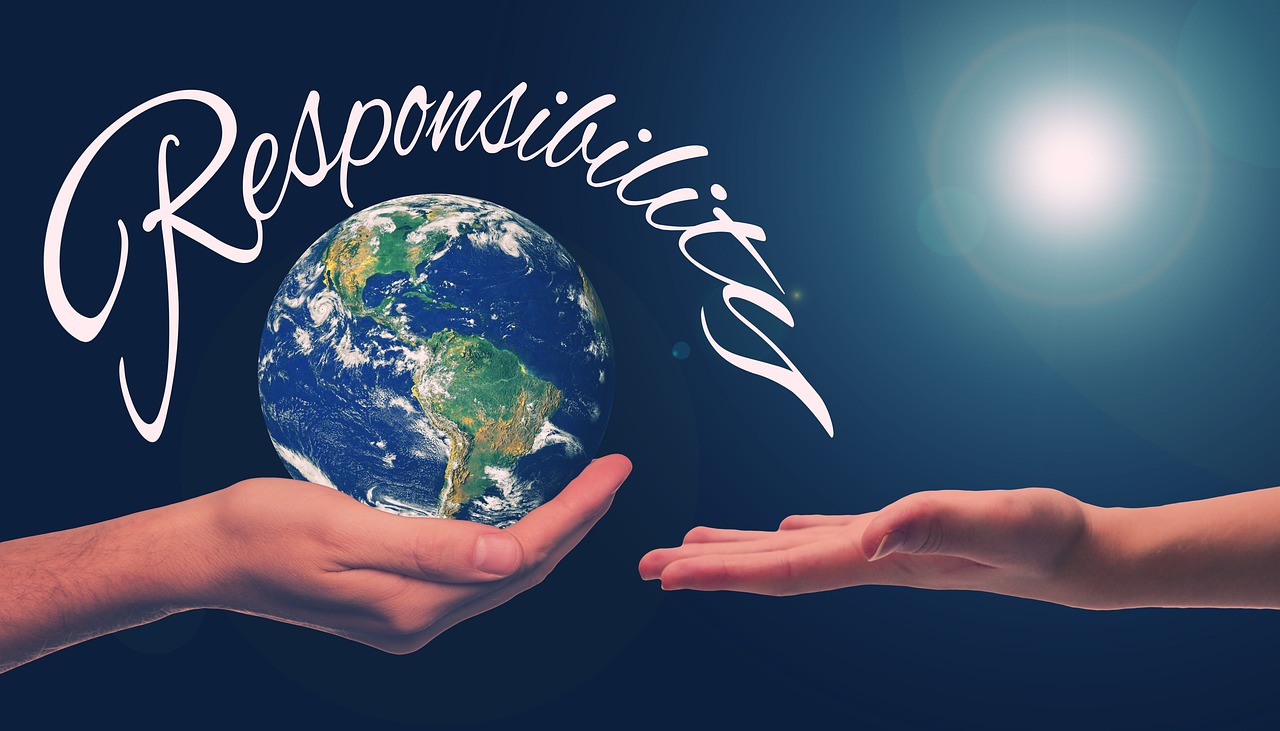
Challenges to Consequentialism
Consequentialism, while a compelling framework for evaluating moral actions based on their outcomes, is not without its **challenges**. One of the primary criticisms is that it can lead to morally questionable decisions if the ends are deemed to justify the means. For instance, consider a scenario where a lie could save a life. While the outcome is positive, the act of lying raises ethical concerns. This dilemma highlights a fundamental flaw in consequentialism: it sometimes overlooks the intrinsic value of honesty and integrity.
Another significant challenge arises from the difficulty in predicting outcomes. Life is inherently unpredictable, and the consequences of our actions can be far-reaching and complex. This uncertainty leads to the question: how can one reliably assess whether an action is right or wrong based solely on its outcomes? For example, a decision made with the intent to maximize happiness might inadvertently cause harm to a minority group. This raises ethical questions about fairness and justice, as not all consequences are easily quantifiable or visible.
Moreover, consequentialism often struggles with the **problem of aggregation**. This refers to the challenge of weighing the happiness or suffering of different individuals. How do we compare the suffering of one person against the happiness of many? This dilemma can lead to morally troubling situations where the well-being of a few is sacrificed for the greater good. Such situations can create a slippery slope where individual rights are compromised in favor of collective outcomes.
Additionally, critics argue that consequentialism can lead to a form of moral **relativism**. If the morality of an action is solely based on its outcomes, then actions that are generally considered wrong, such as theft or deception, could be justified if they lead to positive results. This perspective can create a society where moral standards are flexible and subject to manipulation, undermining the foundation of ethical behavior.
To illustrate some of these challenges, we can consider the following table that summarizes key criticisms of consequentialism:
| Challenge | Description |
|---|---|
| Ends Justify the Means | Can lead to morally questionable actions if positive outcomes are prioritized over ethical principles. |
| Unpredictability of Outcomes | Life's unpredictability makes it difficult to assess the morality of actions based solely on their consequences. |
| Problem of Aggregation | Challenges in weighing individual happiness against collective well-being can lead to ethical dilemmas. |
| Moral Relativism | Can justify actions typically deemed wrong if they produce favorable outcomes. |
In conclusion, while consequentialism offers a structured approach to ethics, its challenges raise important questions about morality, justice, and human values. As we navigate our ethical landscapes, it is crucial to consider these challenges and seek a more holistic understanding of what it means to act ethically in a complex world.
- What is consequentialism? Consequentialism is an ethical theory that judges the morality of actions based on their outcomes or consequences.
- What are the main criticisms of consequentialism? Critics argue that it can justify morally questionable actions, struggles with the unpredictability of outcomes, faces the problem of aggregating happiness, and can lead to moral relativism.
- How does consequentialism differ from deontological ethics? While consequentialism focuses on the outcomes of actions, deontological ethics emphasizes the importance of rules and duties regardless of the consequences.

Deontological Ethics and Human Values
Deontological ethics, often associated with the German philosopher Immanuel Kant, emphasizes the importance of duty and adherence to rules over the consequences of actions. In this framework, the morality of an action is judged based on whether it aligns with established duties and moral laws, rather than the outcomes it produces. This approach to ethics profoundly shapes our understanding of human values, as it insists that certain actions are inherently right or wrong, regardless of their consequences. For instance, telling the truth is seen as a moral obligation, even if it may lead to negative outcomes. This stark contrast to consequentialist perspectives invites us to consider the underlying principles that govern our moral compass and how these principles translate into our values.
At the core of deontological ethics is the concept of moral absolutism, which posits that some actions are universally applicable and must be upheld. This leads to a set of fundamental human values that are viewed as non-negotiable. For example, values such as justice, respect, and integrity emerge as essential components of a moral society. These values serve as guiding principles, influencing laws, social norms, and individual behavior. The idea is that by adhering to these values, we create a framework that upholds human dignity and promotes ethical behavior across various contexts.
Moreover, deontological ethics encourages individuals to reflect on their moral obligations toward others. It emphasizes that our duties extend beyond personal interests, requiring us to consider the rights and welfare of others. This perspective is crucial, especially in discussions about human rights, where the inherent dignity of every individual must be respected. Deontological ethics thus advocates for a society where values are not merely subjective or situational but are grounded in a collective understanding of moral duties.
However, the application of deontological ethics is not without its challenges. Critics often argue that rigid adherence to rules can lead to morally questionable outcomes. For instance, if a person must choose between telling the truth and protecting someone from harm, deontological ethics would dictate that truth-telling is paramount, potentially leading to distress or danger for the other person. This raises important questions about the flexibility of moral values and whether they should adapt to specific situations. The real-world implications of deontological ethics invite ongoing debate about how best to balance duty and the complexities of human experience.
In conclusion, deontological ethics provides a robust framework for understanding human values by emphasizing duty, moral laws, and the inherent rights of individuals. It challenges us to uphold certain principles that define our humanity, advocating for a society built on respect and moral integrity. As we navigate the complexities of ethical decision-making, the insights gained from deontological perspectives remain invaluable, prompting us to consider not just what we do, but why we do it.
Frequently Asked Questions
- What is deontological ethics? Deontological ethics is an ethical framework that focuses on the morality of actions based on adherence to rules and duties rather than the consequences of those actions.
- How does deontological ethics influence human values? It shapes human values by establishing fundamental principles such as duty, rights, and moral obligations that guide individual and societal behavior.
- What are some criticisms of deontological ethics? Critics argue that strict adherence to rules can lead to outcomes that may seem morally questionable, highlighting the need for flexibility in ethical decision-making.
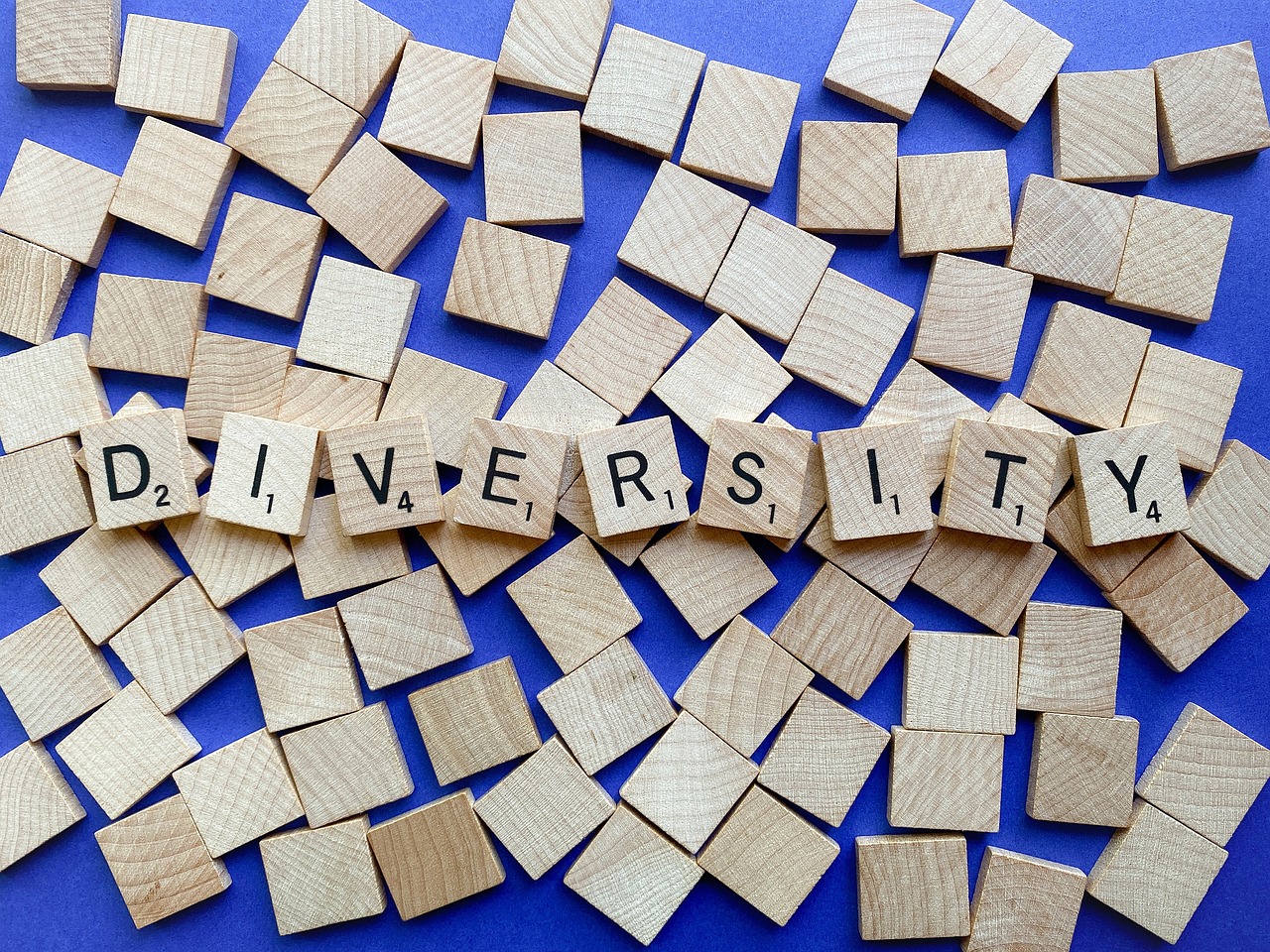
Cultural Influences on Human Values
When we talk about human values, it's impossible to ignore the profound impact that culture has on shaping them. Values are not just abstract concepts; they are deeply embedded in the fabric of our societies, influenced by a myriad of factors including history, religion, and social norms. Each culture has its own unique set of values that dictate how individuals perceive right and wrong, good and bad, and what is deemed important in life. For instance, in many Western societies, values such as individualism and personal freedom are held in high regard. In contrast, many Eastern cultures prioritize collectivism and the well-being of the community over the individual. This divergence illustrates just how significant cultural context is in defining human values.
Moreover, cultural influences extend beyond mere definitions; they actively shape our behaviors and interactions. Take, for example, the concept of respect. In some cultures, respect is shown through hierarchy and adherence to authority, while in others, it may be expressed through egalitarianism and open dialogue. This leads to fascinating variations in social interactions, communication styles, and even conflict resolution. It's a reminder that what might be considered polite or respectful in one culture could be perceived as rude or dismissive in another.
As we navigate through a world that is becoming increasingly interconnected, understanding these cultural influences on human values becomes even more crucial. Globalization has created a melting pot of ideas and beliefs, leading to a blending of values that can sometimes create confusion or conflict. For instance, the rise of social media has allowed for the rapid spread of cultural values across borders, but it has also led to the questioning of traditional values and norms. This phenomenon raises important questions: Are we losing our cultural identities in the process? Or are we simply evolving to embrace a more global perspective on human values?
To illustrate the differences in cultural values, consider the following table that highlights some key distinctions between Eastern and Western perspectives:
| Aspect | Eastern Values | Western Values |
|---|---|---|
| Individual vs. Collective | Collectivism | Individualism |
| Authority | Respect for hierarchy | Equality and egalitarianism |
| Conflict Resolution | Indirect communication | Direct communication |
| Family Structure | Extended family emphasis | Nuclear family focus |
This table serves as a snapshot of how cultural contexts can significantly influence our values. As we explore these differences, we must also recognize the common threads that unite us as humans, despite our diverse backgrounds. Values such as love, compassion, and justice resonate across cultures, reminding us that while our expressions of these values may differ, the underlying sentiments are often universal.
In conclusion, cultural influences on human values are profound and multifaceted. They guide our actions, mold our perceptions, and shape our interactions with one another. As we continue to engage in a global dialogue, it becomes essential to respect and understand these differences while finding common ground. After all, in a world that often feels divided, understanding our shared humanity can pave the way for a more harmonious existence.
- How do cultural values influence personal behavior?
Cultural values dictate social norms and expectations, which in turn guide individual behavior and decision-making. - Can cultural values change over time?
Yes, cultural values can evolve due to various factors, including globalization, technological advancements, and shifts in societal norms. - What role does education play in shaping human values?
Education can significantly influence human values by promoting critical thinking, empathy, and awareness of diverse perspectives.

Eastern vs. Western Philosophies
When we dive into the world of philosophy, the distinction between Eastern and Western thought is as profound as it is fascinating. These two philosophical traditions not only shape the way individuals perceive the world, but they also influence societal structures and cultural norms. At first glance, one might think that these philosophies are entirely different, but they often share underlying themes, albeit expressed through different lenses. Eastern philosophies, which include traditions such as Confucianism, Taoism, and Buddhism, tend to emphasize harmony, community, and the interconnectedness of all beings. In contrast, Western philosophies, rooted in the works of thinkers like Socrates, Plato, and Aristotle, often focus on the individual, reason, and the pursuit of personal rights.
To illustrate the differences and similarities between these philosophies, let's consider some key aspects:
| Aspect | Eastern Philosophy | Western Philosophy |
|---|---|---|
| Focus | Interconnectedness and community | Individualism and personal rights |
| Ethical Framework | Relational ethics, harmony, and balance | Deontological ethics, duty, and rights |
| Nature of Reality | Holistic and cyclical view of life | Linear and analytical view of existence |
| Approach to Knowledge | Intuitive and experiential understanding | Logical reasoning and empirical evidence |
One might wonder, how do these differences manifest in everyday life? For instance, in Eastern cultures, the concept of collectivism often prevails, where decisions are made with the community's well-being in mind. This can be seen in practices such as family-oriented decision-making and an emphasis on social harmony. Conversely, Western cultures typically celebrate individualism, encouraging personal expression and the pursuit of one's own goals. This manifests in legal systems that prioritize individual rights and freedoms.
Moreover, the spiritual dimension in Eastern philosophies often intertwines with daily life, where practices like meditation and mindfulness are integrated into routines, promoting a sense of peace and balance. In contrast, Western philosophies may lean more towards a secular approach, where spirituality is often separated from philosophical inquiry, focusing instead on rational thought and scientific inquiry.
However, it's essential to recognize that these distinctions are not absolute. Globalization has led to a blending of these philosophies, creating a rich tapestry of beliefs that can be seen in modern societies. As we continue to interact on a global scale, the lines between Eastern and Western philosophies blur, leading to a more comprehensive understanding of human values and ethics.
- What are the main differences between Eastern and Western philosophies?
Eastern philosophies focus on community and interconnectedness, while Western philosophies emphasize individualism and personal rights. - How do these philosophies influence modern society?
They shape cultural norms, ethical frameworks, and social structures, often blending due to globalization. - Can these philosophies coexist?
Yes, many individuals and cultures integrate aspects of both Eastern and Western thought into their belief systems.

Globalization and Value Change
Globalization is a powerful force that has reshaped our world, and its impact on human values is profound and multifaceted. As nations become more interconnected through trade, technology, and communication, the values that define societies are increasingly influenced by this global exchange. Think of globalization as a vast ocean, where different cultures are like ships navigating through waves of ideas, beliefs, and practices. Sometimes they collide, sometimes they blend, but the result is a rich tapestry of human experience.
One of the most significant effects of globalization is the blending of cultures. As people from diverse backgrounds interact, they share their values, leading to a transformation in how individuals perceive ethics, morality, and societal norms. For instance, the rise of social media has allowed for the rapid dissemination of ideas, making it easier for values to transcend borders. In this way, a concept that originated in one culture can quickly gain traction in another, creating a shared global value system.
However, this blending is not without its challenges. While globalization promotes the exchange of ideas, it can also lead to a clash of values. Consider how Western ideals of individualism often contrast sharply with Eastern collectivist values. In many Western societies, personal freedom and self-expression are paramount, while in Eastern cultures, community and familial obligations often take precedence. This divergence can create tension as cultures grapple with the influence of global values that may not align with their traditional beliefs.
Moreover, globalization often leads to the commodification of values. As cultures become more intertwined, there is a risk that unique cultural identities may be overshadowed by a dominant global culture, often driven by consumerism and capitalism. This phenomenon can dilute the significance of local values and traditions, leading to a homogenization of beliefs. For example, the global spread of fast food chains has not only changed eating habits but also influenced values around health, community dining, and even environmental responsibility.
To illustrate this point, consider the following table that highlights some of the key values affected by globalization:
| Value | Pre-Globalization Perspective | Post-Globalization Perspective |
|---|---|---|
| Community | Strong emphasis on local ties and traditions | Increased focus on global networks and online communities |
| Consumerism | Value placed on local products and craftsmanship | Shift towards mass-produced goods and global brands |
| Environmental Responsibility | Local practices aimed at sustainability | Global awareness but often overshadowed by economic growth |
As we navigate this complex landscape, it’s essential to recognize that globalization is not a one-size-fits-all solution. The challenge lies in finding a balance between embracing global values and preserving local traditions. We must ask ourselves: How can we honor our cultural heritage while also being open to new ideas? This is where the importance of dialogue comes in. By fostering conversations between cultures, we can create a more inclusive understanding of values that respects both local and global perspectives.
In conclusion, globalization is a double-edged sword when it comes to human values. It offers opportunities for growth and understanding but also poses risks of cultural erosion and value conflict. As we move forward in this interconnected world, it is crucial to remain vigilant and proactive in shaping a value system that reflects the best of both local traditions and global ideals.
- What is globalization?
Globalization refers to the process by which businesses or other organizations develop international influence or start operating on an international scale. - How does globalization affect cultural values?
Globalization can lead to the blending of cultures, resulting in both the sharing of values and potential clashes between differing cultural beliefs. - Is globalization beneficial or harmful to local traditions?
The impact of globalization can be both beneficial and harmful; it can promote cultural exchange but may also threaten the preservation of unique local traditions. - How can we balance global and local values?
By fostering open dialogue and encouraging the sharing of ideas while respecting local traditions, we can work towards a balanced value system.
Frequently Asked Questions
- What are human values?
Human values are the fundamental beliefs and principles that guide our behavior and decision-making. They encompass concepts like honesty, integrity, respect, and empathy, shaping how we interact with others and our environment.
- How do ethics influence human values?
Ethics serve as a framework for determining what is right or wrong, directly impacting our values. Different ethical theories, such as consequentialism and deontological ethics, provide various lenses through which we can understand and prioritize our values.
- What is consequentialism, and how does it relate to human values?
Consequentialism is an ethical theory that evaluates the morality of actions based on their outcomes. This perspective can shape human values by prioritizing actions that lead to the greatest overall good, influencing how we make decisions in personal and societal contexts.
- Can you explain utilitarianism?
Utilitarianism is a branch of consequentialism that advocates for actions that maximize happiness or benefit for the majority. It challenges individuals to consider the broader impact of their choices, often leading to a collective understanding of societal values.
- What are some criticisms of consequentialism?
Critics argue that consequentialism can justify harmful actions if they lead to a perceived greater good. It may overlook individual rights and moral duties, raising concerns about its application in real-world scenarios.
- How does deontological ethics differ from consequentialism?
Deontological ethics focuses on the morality of actions themselves rather than their outcomes. It emphasizes duties and rules, guiding individuals to uphold moral obligations and human rights, which can lead to a different set of values compared to consequentialist approaches.
- How do cultural influences shape human values?
Cultural contexts play a significant role in defining and prioritizing human values. Different societies may emphasize various values based on their historical, social, and religious backgrounds, leading to a rich diversity of beliefs and practices worldwide.
- What are the differences between Eastern and Western philosophies regarding human values?
Eastern philosophies often emphasize community and harmony, while Western philosophies tend to focus on individualism and rights. These contrasting perspectives highlight how cultural backgrounds shape our understanding of ethics and values.
- How does globalization affect human values?
Globalization fosters interconnectedness, leading to the blending of diverse value systems. This process can result in shifts in human values as cultures interact, adapt, and sometimes adopt aspects of each other's ethical frameworks.

